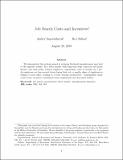Files in this item
Job search costs and incentives
Item metadata
| dc.contributor.author | Zapechelnyuk, Andriy | |
| dc.contributor.author | Zultan, Ro'i | |
| dc.date.accessioned | 2020-09-09T23:37:16Z | |
| dc.date.available | 2020-09-09T23:37:16Z | |
| dc.date.issued | 2019-09-10 | |
| dc.identifier | 260975248 | |
| dc.identifier | 3ce89d4a-7091-4493-bcd6-c14d66223f1c | |
| dc.identifier | 000566757400002 | |
| dc.identifier.citation | Zapechelnyuk , A & Zultan , R 2019 , ' Job search costs and incentives ' , Economic Theory Bulletin , vol. First Online . https://doi.org/10.1007/s40505-019-00176-2 | en |
| dc.identifier.issn | 2196-1093 | |
| dc.identifier.other | ORCID: /0000-0001-5033-3848/work/63716971 | |
| dc.identifier.uri | https://hdl.handle.net/10023/20598 | |
| dc.description.abstract | We demonstrate that policies aimed at reducing frictional unemployment may lead to the opposite results. In a labor market with long-term wage contracts and moral hazard, any such policy reduces employees’ opportunity costs of staying on a job. As employees are less worried about losing their job, a smaller share of employees is willing to exert effort, leading to a lower average productivity. Consequently, firms create fewer vacancies, resulting in lower employment and decreased welfare. | |
| dc.format.extent | 258680 | |
| dc.language.iso | eng | |
| dc.relation.ispartof | Economic Theory Bulletin | en |
| dc.subject | Job search | en |
| dc.subject | Moral hazard | en |
| dc.subject | Labor market | en |
| dc.subject | Unemployment insurance | en |
| dc.subject | HB Economic Theory | en |
| dc.subject | HD Industries. Land use. Labor | en |
| dc.subject | T-NDAS | en |
| dc.subject | SDG 8 - Decent Work and Economic Growth | en |
| dc.subject | SDG 15 - Life on Land | en |
| dc.subject.lcc | HB | en |
| dc.subject.lcc | HD | en |
| dc.title | Job search costs and incentives | en |
| dc.type | Journal article | en |
| dc.contributor.institution | University of St Andrews. School of Economics and Finance | en |
| dc.identifier.doi | https://doi.org/10.1007/s40505-019-00176-2 | |
| dc.description.status | Peer reviewed | en |
| dc.date.embargoedUntil | 2020-09-10 |
This item appears in the following Collection(s)
Items in the St Andrews Research Repository are protected by copyright, with all rights reserved, unless otherwise indicated.

